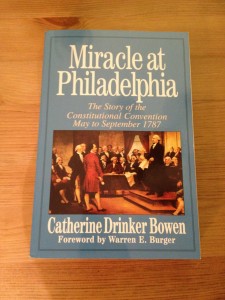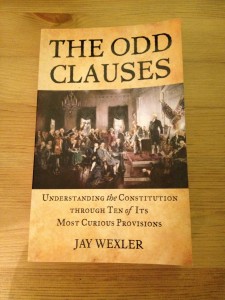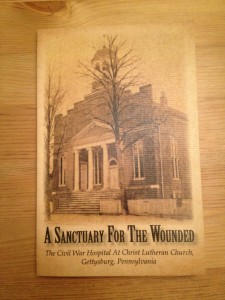Recent Reads
I wanted to do a quick set of mini reviews of some books that I’ve read lately. Due to my preparations for a reading party I hosted on Constitution Day, there’s an easily-detectable theme here. Enjoy!
Miracle At Philadelphia
Catherine Drinker Bowen

A few months ago, I read Bowen’s biography of Sir Edward Coke (the greatest lawyer of all time), The Lion and the Throne. While it wasn’t an easy read, and seemed to focus much more on the events around Coke than on Coke himself, I thought I’d give her take on the events surrounding the Constitutional Convention a shot. I’m glad that I did.
She does a good job of setting the stage quickly and getting right into the details of all the politics involved in the convention coming together. Some of the more prominent personalities – Hamilton, Franklin, Washington, and even lesser-known James Wilson – are the central characters. Madison gets his thoughts in as well, but since he kept copious notes on the convention proceedings, he ends up playing the role of narrator in Bowen’s telling.
Some of my favorite parts involved the struggles of the different personalities trying to get their way. Patrick Henry, as the leader of the Anti-Federalists, ends up looking like the “bad guy” in retrospect. I think we tend to forget that not everyone in the room agreed that the Constitution was a good idea – or even that creating a Constitution was a good idea. Some of the ideas that were floated, from having a 3-person committee act as the executive (because we were so freaked-out by the idea of monarchy), to the “revolutionary” idea that elected offices wouldn’t come with a religious or property-ownership requirement, seem really strange to us today but were all concepts that were experimental at the time. It’s good to remember how far we’ve come.
There is an odd section in the middle where she talks about the people and history of the different sections of the country at that time, including the western frontier. It was good info, but it really felt like it killed the flow of the book to me.
This is a solid history of the personalities and politics of the Convention. I really highly recommend it.
————————————————————
The Odd Clauses
Jay Wexler

This book came up in an article I read on one of the libertarian blogs I read frequently. You have to love the idea of investigating some of the stranger parts of the Constitution, and if the author is the kind of guy who would put Christy’s classic painting of the Convention (with the addition of a few random woodland creatures Photoshopped in) on his book’s cover, you know you’re in for a fun ride.
Wexler doesn’t disappoint. This is a great combination of serious Constitutional scholarship, fascinating historical trivia, and joking-around. It’s quite brilliant.
He does a good job of remaining neutral throughout the book, too. You can just barely detect his own liberal slant on issues in the writing. He does end up going a little nuts in the final chapter though – I suppose he can’t help but rip into the concept of Substantive Due Process (although he does admit that this mechanism also gave us Roe v. Wade).
One of my favorite passages is in the chapter about judicial powers. Wexler imagines the justices operating like a trial court, arguing about whether to let in a certain piece of evidence. Of course, the court splits 4 – 4, with everyone turning to Clarence Thomas for whether to uphold or overrule the objection. He just sits silently. Maybe that’s only funny to SCOTUS nerds.
Overall, if you can tolerate the occasional liberal outburst, this is a really fun book. And you’ll learn a ton in-between laughs.
————————————————————
A Sanctuary For The Wounded
Christ Lutheran Church – Gettysburg, PA

This one is not regularly published. The church self-published this collection of essays – I found it in a book shop in Gettysburg.
Christ Lutheran Church is an old historical church in Gettysburg just west of the center of town. It quickly became a field hospital the morning of July 1, 1863 when the fighting started on the ridges west of town. The church does a weekly program (on Saturday nights, I think) where they tell the story of the church as a hospital and they sing period music, and read period poetry. This book is basically the take-home version of that show.
As a collection of essays, its a little disjointed and scattered. While it begins with an overview of the history of Christ Lutheran itself, it doesn’t focus exclusively on the church, but tells the story of the wounded and those who cared for them in the downtown area. There’s also a collection of 19th century poetry at the end for character.
This was a really brief read. I’m no speed demon, but I finished in about 2 hours. While the information is good and somewhat interesting, this is hardly a deep treatment of the subject of the mess left behind after Gettysburg.